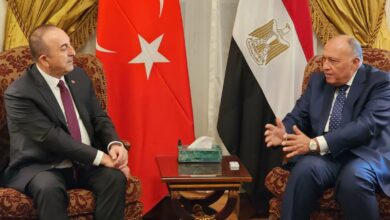TRIPOLI – Rebels clashed with regime loyalists and staged large anti-government protests around Tripoli on Sunday, residents said. Heavy machine gun fire and explosions rang out across the capital on the second day of attacks by what the opposition called "sleeping cells" inside the city that has been Muammar Qadhafi's stronghold throughout the 6-month-old civil war.
At the same time, hundreds of rebel forces were rapidly closing in on Tripoli, advancing to within 25km west of the capital and rushing forward at full speed in pickup trucks and on foot.
"We are scared and staying in our houses, but the younger boys are going out to protect our homes," said a woman who spoke to The Associated Press by telephone from the pro-rebel Tripoli neighborhood of Bin Ashour. She spoke on condition of anonymity for fear of reprisal. She said a neighbor's son was shot dead on Saturday night by Qadhafi troops as he tried to protect his street with a group of rebel youth.
Nuri al-Zawi, another resident of Bin Ashour, told the AP by phone that the rebels were using light arms to protect their streets, and in some cases were using only their bodies to fend off the Qadhafi troops riding in pickup trucks.
"We are used to this situation now. We are a city that is cut off from the world now," he said.
Libyan rebels said Saturday that they had launched their first attack on Tripoli in coordination with NATO and gunbattles and mortar rounds rocked the city. NATO aircraft also made heavier than usual bombing runs after nightfall, with loud explosions booming across the city.
The residents reported clashes in neighborhoods all over Tripoli as well as the city's Mitiga military airport. They said they heard loud explosions and exchanges in of gunfire in the Fashloum, Tajoura and Bin Ashour neighborhoods. Residents and opposition fighters also reported large anti-regime protests in those same neighborhoods. In some of them, thousands braved the bullets of snipers perched atop high buildings.
Mukhtar Lahab, a rebel commander closing in on Tripoli and a former captain in Qadhafi's army, said his relatives inside the capital reported mass protests in four neighborhoods known as sympathetic to the opposition: Fashloum, Souk al-Jouma, Tajoura and Janzour. He said mosques there were rallying residents with chants of "Allahu Akbar" or "God is great," broadcast on loudspeakers.
Hundreds of rebels were also advancing rapidly toward Tripoli from the west and the south.
Those in the west moved beyond the village of Jedaim to within 25km of Tripoli, according to an Associated Press reporter with them at the front. The AP saw hundreds of rebels at the front line streaming toward the capital, some in pickup trucks and others on foot trying to hitch rides.
The mood was euphoric, with some shouting: "We are getting to Tripoli tonight." They were shooting in the air, honking horns and yelling "Allahu Akbar."
Rebel Murad Dabdoub told the AP that Qadhafi's forces were pounding rebel positions west of the city with rockets, mortars and anti-aircraft fire.
"We are not going back. God willing, this evening we will enter Tripoli," said Issam Wallani, another rebel. He spoke from Jedaim, which has been turned into the staging area for fighters moving toward the capital. He spoke as pickup trucks loaded with fighters headed to the front and the thud of mortar shells was heard at two-minute intervals.
A Tripoli resident said the capital was virtually deserted on Sunday, with stores shuttered and no cars or pedestrians out on the streets. Some areas suffered power outages, according to the resident, who was reached by telephone and would only identify himself by one name, al-Tarhouni.
An AP reporter in Tripoli, meanwhile, said many of the staff at the Tripoli hotel where foreign journalists are staying did not show up for work on Sunday, a development that suggests residents were too frightened to venture out.
"There are thousands and thousands of soldiers who are willing to defend the city," Libyan government spokesman Moussa Ibrahim told a news conference in Tripoli. He accused the rebels of committing atrocities in areas under their control and appealed for a cease-fire.
He warned of "disasters" if Qadhafi's regime falls.
NATO said the shifting battle lines and concentration of fighting in towns and villages are making it more difficult to identify and engage targets for airstrikes.
"It's much tougher to do in an urban area," he said. "This requires very precise and deep intelligence to achieve without endangering the civilian population."
In Dubai, Libya's new rebel-allied ambassador to the United Arab Emirates, urged for stepped up NATO air attacks over Tripoli, including the use of helicopter gunships.
"We are asking for more Apache action" to counter Qadhafi forces clashing with rebels, said Aref Ali Nayed, who is also spokesman for a rebel transition team.
The United Arab Emirates is among the Arab states that have strongly backed the rebellion against Qadhafi and could provide critical assistance if the Libyan leader is ousted.




